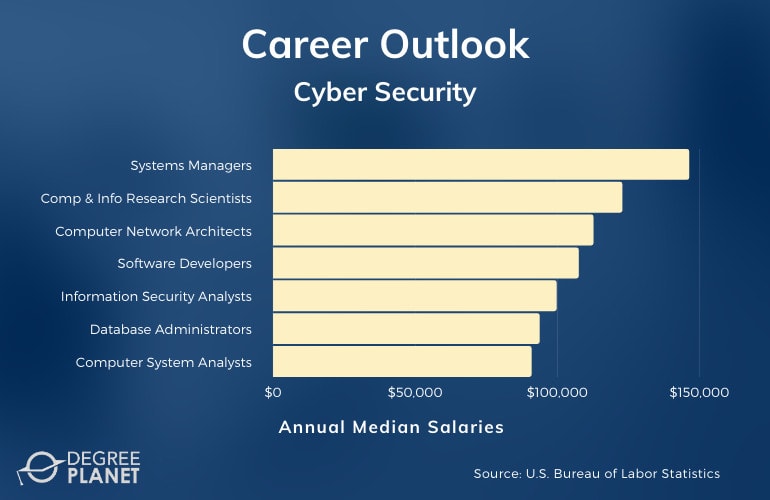Is a masters in cyber security worth it? Not many fields offer as many exciting job roles and highly positive job growth projections at the same time.

With the right expertise, work experience, and qualifications, you might find work combating cybercrime. Professionals in this field can help teams safeguard large IT networks, and they may also work with the NSA or Homeland Security, analyzing and responding to cyberthreats.
Editorial Listing ShortCode:
If you’re ready for a technically challenging graduate program that can open doors to great career or advancement opportunities in this field, then you may want to consider earning a master’s degree in cyber security.
Is a Masters in Cyber Security Worth it?

Yes, a masters in cyber security is worth it for many students. The stakes are high when it comes to cyber security risks, so skilled cyber security defense experts could be well placed in the coming decade to find available jobs, good pay, and the rewards of doing meaningful work.
According to the Bureau of Labor Statistics, information security analyst jobs are poised to experience an astounding 31% growth over the next ten years. Professionals in this field can help leaders in business, government, and national security agencies counter malware, ransomware, and other forms of malicious cyber penetration and aggression.
Some information security specialists pursue senior managerial roles. Senior specialists can help manage and implement security protocols and risk reporting practices for large databases or large IT networks.
Editorial Listing ShortCode:
Cryptography specialists, cybercrime forensics experts, and penetration testers are other common roles in the cybersecurity arena. Your masters program may give you the option to complement your cybersecurity credentials with a concentration, which can open the door to further possibilities.
For example, a concentration in criminal justice or in software engineering or development can prepare you to pursue a career in cyber crime enforcement or in developing new security software.
How to Decide Whether a Masters in Cyber Security Is Right for You

Here are just a few of the reasons why students decide to pursue a masters in cyber security. If you identify with any of the following, then getting a masters in cyber security may be a good fit for you.
1. You want good job prospects when you graduate.
It can feel risky to commit time and money to a graduate degree when you’re uncertain about job prospects. Fortunately, the field of cybersecurity is one of the fastest growing industries.
Cybersecurity jobs are slated for truly exceptional job growth over the next 10 years. The demand for experts in this field will likely continue to increase as more companies collect their users’ or clients’ data.
2. You want to work in a job that matters.

Qualified cyber defense analysts and leaders have a crucial role to play, protecting both US companies and many national US interests from a growing wave of malicious cyber threats.
If you’re a computer whiz with an interest in serving the national interest, you may want to consider the path that leads toward a career as a cybersecurity expert.
3. You want to work in national intelligence or defense roles.
Building out your cyber defense skill set could be a great way to combine fascinating computer work with public service. You may be intrigued by the idea of working for a large federal agency, such as Homeland Security, the NSA, or the CIA, for example.
This pathway might be especially intriguing if you want to eventually work in secretive and high-stakes cyber command and cyber response support or leadership roles.
5 Things You Can Do with a Masters in Cyber Security

An MS in Cybersecurity can qualify you for a range of job roles, so it can be helpful to think about what kinds of skills you want to specialize in.
For instance, you might want to pursue managerial roles, work as a cyber forensics specialist in law enforcement, or support a federal agency by leading tactical cyber defense and response operations!
1. IT Systems Manager

IT systems managers and cybersecurity analysts provide security-focused expertise to a team of managers, overseeing large IT networks and databases.
Managers often supervise other IT security specialists, report on security assets, recommend security upgrades, and help develop effective IT security policies and protocols.
2. Cryptographer

Cryptographers work with and analyze complex software algorithms. They use their cybersecurity software expertise to help analyze cryptography tools and strategies.
Cryptographers can also help plan and implement measures for safeguarding sensitive communications and data transmissions.
3. Information Security Systems Analyst

Information security systems analysts can serve many roles, such as researching, procuring, and monitoring the installation of defensive software and firewalls.
They can also help organizations develop or upgrade information security protocols and policies based on their knowledge of best practices in the field.
Editorial Listing ShortCode:
Information security systems analyst might also support or oversee security testing or penetration testing for the early identification of security vulnerabilities. They can then deliver cybersecurity risk assessments.
4. Security Software Developer
Some students combine cybersecurity credentials with a concentration in software development to pursue work for a computer software firm or cybersecurity company. Security software developers can help test, develop, sell, or troubleshoot cybersecurity software applications.
5. Ethical Hacker or System Penetration Tester

Penetration testing experts develop and use hacking skills for the purpose of simulating any number of ways malicious actors might try to hack an IT network, decrypt encrypted data, or penetrate or disrupt a large IT network.
Penetration testing can help identify hidden vulnerabilities or help inform the design or development of new cybersecurity software applications or protocols.
Master’s in Cyber Security Alternatives

You may be wondering if getting a master’s degree in a related field is a better fit for you. Here are some other masters degrees that intersect with cybersecurity but prepare you for unique career pathways.
- Master’s in Information Technology. A masters in IT can help prepare you to manage large IT systems, teams, and networks. Your learning will likely involve some study of cybersecurity concepts as well as effective project management skills related to IT leadership. Your training can help equip you to drive IT innovation for your employer in areas such as data storage and administration, digital automation, digital collaboration, and the use of artificial intelligence for improving a range of business outcomes.
- Master’s in Cybercrime. In a masters program in cybercrime, you’ll learn about cyber security tools and methods as well as criminal justice concepts. This kind of degree program might be a good alternative if your goal is to work in cybercrime investigation and enforcement work with governmental law enforcement agencies.
- Master’s in Software Engineering. If you like engineering, the scientific method, or empirical problem-solving work, then a masters in software engineering might be a good alternative degree. Training in cybersecurity and a masters in software engineering can help prepare you for jobs at the cutting edge of cybersecurity software research and development work. Cybersecurity software engineers might usher in new software tools or new software concepts for use against quickly evolving cyberthreats.
Considering some alternative degrees can help you decide if an MS in Cyber Security is the best degree for you. It might also help you identify your most important professional goals and preferences.
Cyber Security Careers & Salaries

According to the Bureau of Labor Statistics, a masters in cybersecurity can help prepare you for a range of lucrative career options related to cybersecurity and information technology.
| Careers | Annual Median Salaries |
| Computer and Information Systems Managers | $146,360 |
| Computer and Information Research Scientists | $122,840 |
| Computer Network Architects | $112,690 |
| Software Developers | $107,510 |
| Information Security Analysts | $99,730 |
| Database Administrators | $93,750 |
| Computer System Analysts | $90,920 |
| Computer Programmers | $86,550 |
| Network and Computer Systems Administrators | $83,510 |
| Web Developers | $73,760 |
As you can see, cyber security expertise can connect to many careers, including IT management, cyber defense and forensics, database administration, or even software development. The career path you follow may depend on the concentration you wish to pursue.
Is Cyber Security a Good Career Field?

Yes, cyber security is a good career field for many professionals. With an average salary ranging between $83,510 and $146,360 and 11% job growth for computer and information technology occupations (Bureau of Labor Statistics), earning potential and job outlook are higher and faster than national averages.
Information security analyst jobs are expected to have an especially high growth rate of 31% through the next ten years. Strong demand in the field means you may have better chances of selecting from the best jobs possible, based on your professional qualifications.
Cyber security experts can work for any number of large companies or agencies with large IT networks or critical information storage systems.
Editorial Listing ShortCode:
A cyber security masters with the right concentration may lead to careers in security software development work. Graduates also pursue careers as penetration testers, cyberattack incident commanders, or cyberattack forensics specialists.
Your MS in Cyber Security can help you qualify to pursue senior managerial roles in this field. Common leadership roles include top information systems officer, senior database administrator, and lead computer network architect.
How Hard Is a Masters in Cyber Security?

A cybersecurity masters program often includes a good amount of highly technical, complex, and detailed concepts and information. Applying concepts in this field is also likely to require a high level of analytical thinking and problem solving.
Cyber security work can involve working with, understanding, and analyzing complex computer coding and digital algorithms. So, advanced math and analytical thinking skills can be beneficial for success in cybersecurity graduate programs.
Since this field involves rapid technological innovations, it’s helpful if you can learn new concepts and information quickly from a range of resources. You may continue researching on your own as well as learning on the job.
What Job Can I Get with a Masters in Cyber Security?

There are many cybersecurity jobs that only require an undergraduate degree, so earning a master’s degree in cyber security can often open the doors to many more career and advancement opportunities.
That said, what job you can get will likely depend on various factors, such as your area of concentration, your work experience, and where you live. Common careers in this field include computer systems analyst, information security analyst, database administrator, software developer, and computer network architect.
There are also jobs available in a range of professional settings based on your goals, interests, and degree concentrations. You may be intrigued by the prospect of working in a cyber command role with Homeland Security, the NSA, the FBI, or the CIA.
Some cybersecurity specialists want to pursue senior management roles in the IT field while others want to pursue careers as cyber forensics experts with large corporations or consulting firms.
How Much Can You Make with a Masters in Cyber Security?

A master’s in cyber security can help you qualify for a wide variety of jobs in this growing field. Many of the positions in this field have higher than average salaries, and a masters degree may offer you even higher earning potential.
According to the Bureau of Labor Statistics, computer and information research scientists make an average salary of $122,840, and information security analysts make average annual salaries of $99,730.
While the average annual salary for software developers is $107,510, the average salary for computer systems analysts is $90,920. A masters in cybersecurity can help prepare you to pursue information security roles in a wide range of professional settings.
With the growing penetration of information technologies and cloud storage systems across so many industries, workers with cyber security credentials and expertise will likely be in demand for years to come. This makes earning a cyber security degree worth it for many students.
Getting Your Masters in Cyber Security Online

Getting a masters online in cybersecurity can help you boost your credentials in the field or make a career pivot to take advantage of the growing technological trend.
If you’re ready to take a deep dive into computer technology concepts and software coding and algorithms, you can start today by exploring accredited universities.
With today’s vast range of online cyber security degree programs, you’re likely to find fully accredited cyber security masters programs with study options that match your goals and interests as well as your busy schedule.

